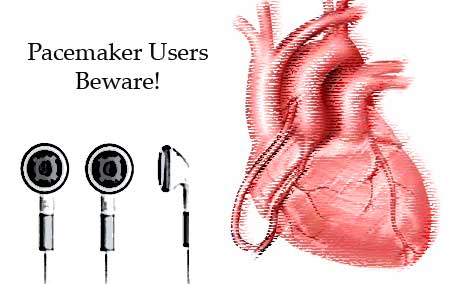New studies reveal that people with pacemakers or implanted defibrillators should be careful about where they store their iPod or other MP3 headphones.
According to a report presented at the American Heart Association meeting in New Orleans, Louisiana, headphones contain magnets that could interfere with the signals the device sends to the heart, if placed right over it.
Researchers have tested 8 headphone models like clip-on, earbud variety, etc. on 60 pacemaker and defibrillator patients. They placed the headphones directly over the heart device to see the results. 15% pacemaker and 30% defibrillator patients detected the difference. It is said that neodymium, the magnetic substance found in most earphones, can temporarily stop defibrillators from detecting abnormal heart rhythms. Defibrillators either send low or high-energy signals to the heart to regulate or slow down dangerously fast heartbeats. The researchers noticed the effect irrespective of whether the headphones were plugged into a music player or not.
Pacemakers regulate the heartbeat. They are designed to boost slow heart rhythms, and when exposed to magnets, they may deliver false signals that instruct the heart to beat faster, whether it needs to or not. Defibrillators correct abnormal heart rhythms. Headphones interference can be so disruptive that a defibrillator can fail to fire live-saving electric charges. Dr. William Maisel from Medical Device Safety Institute at Beth Israel Medical Centre, Boston says, “For patients with pacemakers, exposure to the headphones can force the device to deliver signals to the heart, causing it to beat without regard to the patients’ underlying heart rhythm. Exposure of a defibrillator to the headphones can temporarily deactivate the defibrillator.†He goes on to say that after removing the headphones, the heart devices function normally, thus clearly stating the effect headphones have on these heart devices. Some headphones are said to generate a magnetic field 20 times stronger than that needed to cause interference. Maisel says, “Patients should not focus on the brands we tested but instead should simply be instructed to keep their headphones at least 3 cm from their implantable devices.†If they were kept at more than 3cm away from the skin no interference was detected.
However, not all experts are convinced that MP3-player headphones pose a hazard to heart implant patients. Karol Watson, MD, PhD, co-director of preventive cardiology at UCLA, states that this study is theoretical and requires more evidence to prove that headphones interfere with heart devices. She says, “There’s no reported cases in the headphone study. Plenty of people with implanted cardiac devices listen to iPods, so if there was something there, we would have seen it.†Agreeing with Watson, other research presented at the meeting suggests that most devices do not affect the implants in a particular way, even if they sometimes produce electromagnetic interference in a laboratory test.

